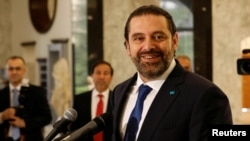Lebanon's Prime Minister Saad Hariri has been named to form a new government following consultations by President Michel Aoun with top members of parliament at the presidential palace in Baabda.
Hariri said Thursday that he would try to form the government quickly after listening to the demands of various political factions. He told journalists the main tasks of the new government would be to tackle corruption, economic reform and the Syrian refugee crisis.
Hariri, whose father, former Prime Minister Rafiq al-Hariri, was assassinated in 2005, has served two terms as head of government amid bickering among political and sectarian factions.
Alluding to the discord between Sunni and Shiite political factions, he insisted Lebanon has narrowly avoided a sectarian conflict, similar to the one raging in Syria.
He said he would now work to try to build a country that Lebanese want and deserve while keeping the many regional threats at bay. He urged people to remain united, saying only unity will protect Lebanon from strife.
Hariri also touched upon the serious economic problems facing a new government and the expectations of the country's citizens and creditors.
He said in addition to dealing with the Syrian refugee crisis, the new government would need to carry out administrative and economic reforms to benefit the people and the country's many investors, who would like to see a return on their money.
Hilal Khashan, a political science professor at the American University of Beirut, told VOA that Hariri tried to alleviate the country's debt several months ago at a donor conference in Paris, but the debt remains massive.
"The Lebanese debt goes back to the days of his late father, when he borrowed something like $40 billion," Khashan said. "And the figure has jumped to more than $75 billion right now."
Khashan stressed that the one major issue Hariri avoided mentioning was that he is "under pressure from both the U.S. and Saudi Arabia not to include Hezbollah in his new government." However, he said the problem would be surmounted and that Hezbollah was "eager to form a new government quickly."
Both the United States and the Gulf Cooperation Council have enacted new economic sanctions against Hezbollah, which has played an active role in defending the government of Syrian President Bashar al-Assad.

